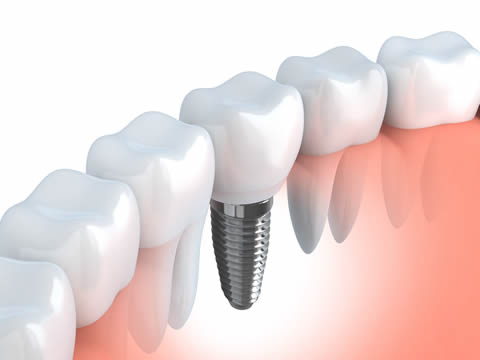Dental Implants Or Dentures?

Our Canterbury dental team look at the pros and cons of these two teeth replacement methods
Traditionally, the loss of any teeth would mean a choice of two options; either leave a gap or replace the missing tooth with a partial, or full, denture. The first option is inadvisable, and not only for aesthetic reasons. Any missing teeth that leave a gap will allow a space for other teeth to encroach into.
Over time, even a single missing tooth can cause other teeth to become crooked and unsightly. Whilst dentures go some way in preventing this from happening, they come with their own ‘problems’.
Even with modern, and greatly improved dentures, some wearers still find them uncomfortable and unstable. Whilst they now look more realistic than may have been the case in the past, they also still fail to replace the lost root of a tooth. Without this, bone degradation is likely to occur and can lead to the dentures becoming ill-fitting and moving around in the mouth. This can lead to socially awkward moments and may also making eating certain foods more difficult.
Are dental implants the answer?
Dental implants are increasingly suggested as the best alternative to dentures, and, at Bradley and Partners Dental and Implant Clinic, we have to say, we totally agree with this analysis. Whilst both methods offer a means of replacing the more visible aspects of tooth loss, dental implants benefit patients in ways that dentures simply can’t.
As mentioned earlier, dentures do not replace the missing root section of a lost tooth, leading to bone loss and a lack of stability. Dental implants, on the other hand, fulfill this very role, and can be thought of as a replacement tooth root. They are usually made from titanium, a material used because it successfully bonds with the bone in the jaw, in a process known as osseointegration. It is this very process that provides such a strong and secure base onto which a crown is finally attached. Once completed, an implant has a very long life if looked after correctly, and those who have them, generally treat and consider them exactly as they do their natural teeth.
How are implants placed?
Unlike dentures, dental implants do require minor surgery in order for them to be placed. This can deter some people who may, instead, opt for surgery free dentures. Most patients that do have dental implants placed though, find that the procedure is nowhere near as uncomfortable as they may have expected.
To perform the treatment, you will need to have a prior appointment where scans and x-rays are taken to assess if sufficient bone is available into which the implant is to be placed. Whilst most patients have sufficient bone; where it has degraded to the point where implant placement may be unsuccessful, we will discuss the option of having a bone graft prior to the procedure. Providing that the bone density is OK, the next step is to make sure that your overall mouth health is good, as diseases such as periodontitis and peri-implantitis (more of those in a later blog) can threaten the survival of your implants. To clean the teeth and gums, we will carry out a scale and polish where necessary.
When you have your dental implant treatment, you will be given a local anaesthetic to minimise any discomfort. Using modern scanning equipment to determine exact positioning, a small hole will then be placed in the jawbone. This is the part that may deter some patients but it really is not as uncomfortable as you may think it will be. Once the hole is in place, the titanium implant will be placed into it.
Whilst some implant treatments for multiple tooth loss do allow for instant placement of the replacement teeth, this is usually not the case with individual implant placement. A time period of around three months, sometimes more, is necessary for the implant to fuse sufficiently with the bone. During this period, you will need to eat softer foods, so as not to put undue stress on the implant, and you will need to keep it clean. We will provide you with the necessary information on how to do this when you receive your treatment. Once the bone and implant are fused, an abutment is attached to the implant and your new crown finally added as the final part of the process.
With a typical lifespan of around twenty years, and often very many more, this one off procedure, with relevant aftercare and monitoring, can save you from the inconvenience that some dentures can bring. Cleaning your implant is much easier too. Unlike dentures which have to be removed from the mouth for cleaning, you simply need to brush and floss your implant as you would your natural teeth. To minimise any risk of infection, we also strongly recommend that you have your teeth scaled and polished by the hygienist at our Canterbury practice on a six monthly basis.
If you would like to find out more about this increasingly popular alternative to dentures, why not arrange to have a consultation with one of our implant dentists? Appointments can be made by calling the reception team at Bradley and Partners Dental and Implant Clinic on 01227 463529.
